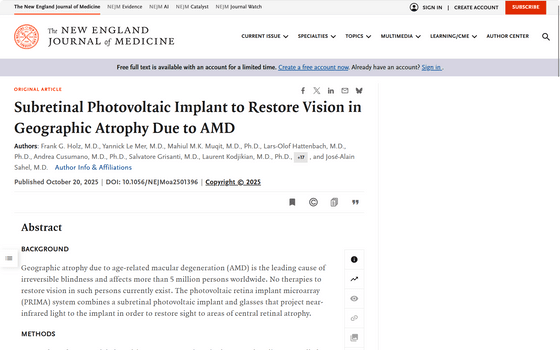Blind people can read again with an intraocular implant linked to smart glasses

People with age-related macular degeneration (AMD) have reportedly regained their vision with an intraocular implant linked to smart glasses.
Subretinal Photovoltaic Implant to Restore Vision in Geographic Atrophy Due to AMD | New England Journal of Medicine

The New England Journal of Medicine Reports Science Corp.'s PRIMA BCI Implant Restores Functional Central Vision to Patients with Geographic Atrophy Caused By Age-Related Macular Degeneration | Science Corporation
Blind patients read again with smart glasses-linked eye implant | The Verge
https://www.theverge.com/news/802905/eye-implant-smart-glasses-restores-vision
Age-related macular degeneration is a disease that affects more than 5 million people worldwide and is considered difficult to reverse once it progresses.
Frank Holz and his colleagues at the University of Bonn in Germany have developed a smart glass-based intraocular implant called 'PRIMA,' which they say has restored vision in patients suffering from age-related macular degeneration. The peer-reviewed paper was published in the New England Journal of Medicine.
PRIMA is an intraocular implant that works in conjunction with specialized smart glasses. It is surgically placed under the patient's retina. It contains a 2mm x 2mm solar panel-like device that receives near-infrared light captured by the smart glasses. PRIMA uses this light to send weak electrical signals to the optic nerve, mimicking the function of retinal cells.
The small size of the panel can be seen when compared to a 1-cent coin, which has a diameter of 19.05 mm.

A study evaluating PRIMA in 38 patients at 17 centers in five countries found that 84% of patients were able to read letters, numbers, and words, and their vision improved.
Most serious adverse events occurred within two months of transplantation, but 95% of these events resolved within two months.

'This is the first time that attempts to restore vision in these cases have been successful,' said co-author José-Alan Sahel. 'More than 80 percent of patients are able to read letters and words, and some are even able to read a page of a book. This is an outcome we never dreamed of when we began this research more than 10 years ago.'
The data and safety monitoring committee for the evaluation trial found that the benefits outweigh the risks of transplant surgery and recommended PRIMA for market approval in Europe. PRIMA has therefore submitted an application for approval to European regulators, with the aim of making it available to patients from 2026. The approval process with health authorities in the United States is also progressing.
Related Posts:







